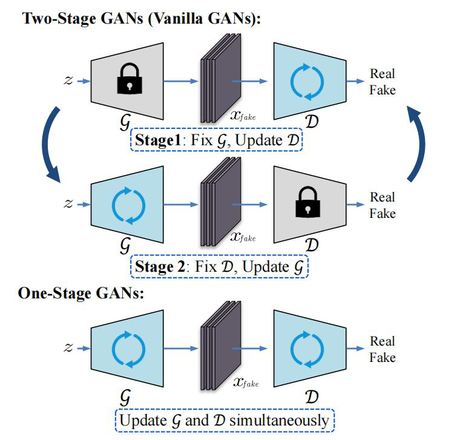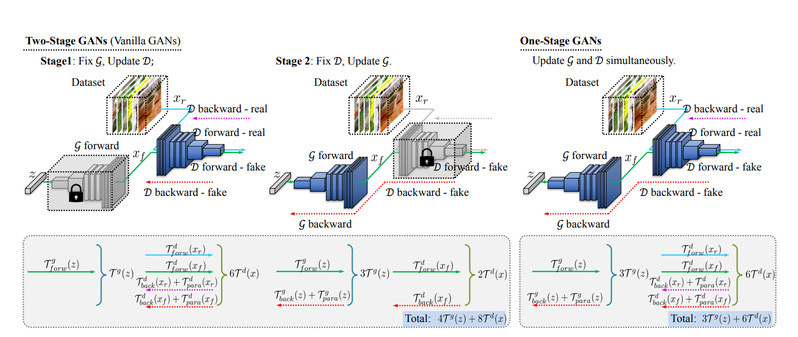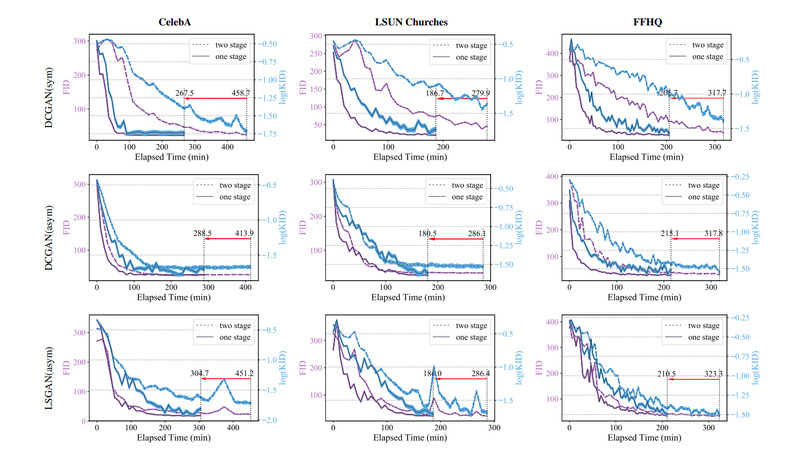Generative Adversarial Networks (GANs) have demonstrated unprecedented success in various image generation tasks. The encouraging results, however, come at the price of a cumbersome training process, during which the generator and discriminator are alternately updated in two stages.

Recent work from the research group led by Dr Mingli Song investigates a general training scheme that enables training GANs efficiently in only one stage.

Based on the adversarial losses of the generator and discriminator, the group categorize GANs into two classes, Symmetric GANs and Asymmetric GANs, and introduce a novel gradient decomposition method to unify the two, allowing us to train both classes in one stage and hence alleviate the training effort.

The group also computationally analyze the efficiency of the proposed method, and empirically demonstrate that, the proposed method yields a solid 1.5× acceleration across various datasets and network architectures. Furthermore, they show that the proposed method is readily applicable to other adversarial-training scenarios, such as data-free knowledge distillation.
The work was presented at CVPR 2021 and could be accessed at https://openaccess.thecvf.com/content/CVPR2021/papers/Shen_Training_Generative_Adversarial_Networks_in_One_Stage_CVPR_2021_paper.pdf, and the codes are available at GitHub - zju-vipa/OSGAN: One-Stage GAN for Efficient Adversarial Learning. The implementation of CVPR 2021 paper: Training Generative Adversarial Networks in One Stage.
About Professor Song
Mingli Song is currently a jointly appointed professor in College of Computer Science and Technology and SIAS, Zhejiang University. He is leading Vision Intelligence and Pattern Analysis (VIPA) Group of ZJU. He received his Ph. D degree in Computer Science and Technology from College of Computer Science, Zhejiang University, and B. Eng. Degree from Northwestern Polytechnical University. He was awarded Microsoft Research Fellowship in 2004.
His research interests mainly include Computational Vision, Pattern Recognition, Machine Learning, Embedded Machine Vision and Visual Interaction. He has authored and co-authored more than 120 scientific articles at top venues including IEEE T-PAMI, IEEE T-IP, T-MM, T-SMCB, Information Sciences, Pattern Recognition, CVPR, ECCV and ACM MM.
He is an associate editor of Information Sciences, Neurocomputing and an editorial advisory board member of Recent Patent on Signal Processing. He has served with more than 10 major international conferences including ICDM, ACM Multimedia, ICIP, ICASSP, ICME, PCM, PSIVT and CAIP, and more than 10 prestigious international journals including T-IP, T-VCG, T-KDE, T-MM, T-CSVT, and TSMCB. He is a Senior Member of IEEE, and Professional Member of ACM.
About SIAS
Shanghai Institute for Advanced Study of Zhejiang University (SIAS) is a jointly launched new institution of research and development by Shanghai Municipal Government and Zhejiang University in June, 2020. The platform represents an intersection of technology and economic development, serving as a market leading trail blazer to cultivate a novel community for innovation amongst enterprises.
SIAS is seeking top talents working on the frontiers of computational sciences who can envision and actualize a research program that will bring out new solutions to areas include, but not limited to, Artificial Intelligence, Computational Biology, Computational Engineering and Fintech.

